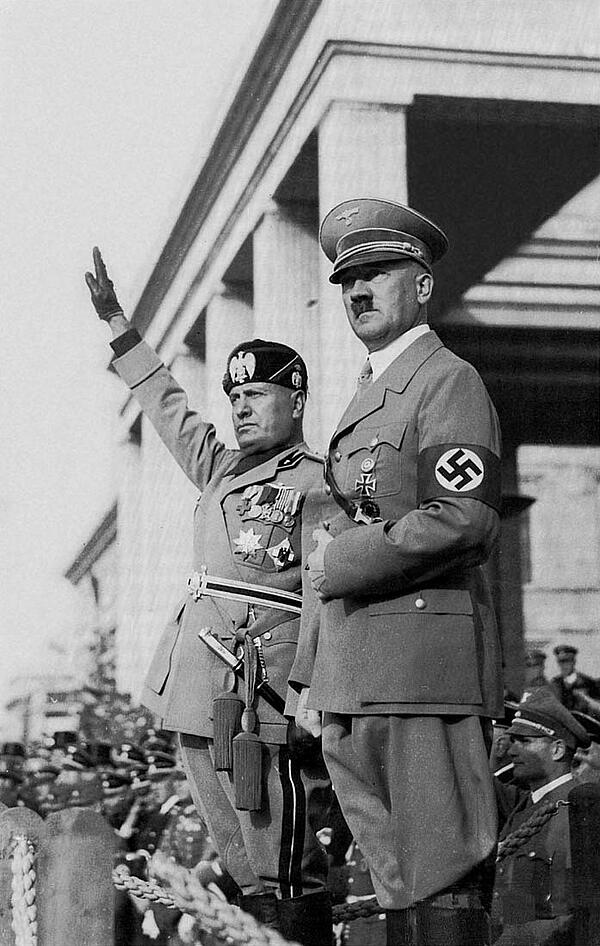Italy and Germany 1936 to 1940
Following Italy’s frowned-upon invasion of Abyssinia, Mussolini was left with the choice of just two allies - Spain and Germany - and he was determined to foster good relations with each.
Determined to bolster both his own and his country’s power and influence across Europe, Mussolini looked to forge strong links with Spain and Germany following the frowned-upon invasion of Abyssinia.
When a civil war broke out in Spain in July of 1936, with the Nationalists and the Republicans going head to head, the latter received support from across Europe. Mussolini’s Italy, Stalin’s Russia and Hitler’s Germany all sent weapons and battle supplies, as well as troops, to help.
While Mussolini had sent help in a bid to boost his influence and his control across Europe by involving Italy with Spain, Franco did not believe in parliamentary Government and, as such, he did not have true power in Spain in 1936. However, this was to follow in the years after 1936. While Mussolini was busy attempting to link Italy to Spain and bolster his power, many Italians were wary about Franco and the involvement of the two nations. Some Italians who had moved away from their homeland and felt wary of the new link Mussolini was attempting to forge, created a troop called the Garibaldi Brigade and fought in the civil war, on the side of the Republicans. In one battle, called the Battle of Guadalajara, the men fighting were Italians versus other Italians. This conflict was won by the Republican side and Mussolini blamed this defeat on the Garibaldi Brigade. Such was his anger at this turn of events that, three months after the battle had ended, the head of the brigade, Carlos Roselli, was found dead. It was rumoured that Mussolini’s secret agents had been behind the murder.

The vast majority of Italians were not in favour of the Civil War in Spain as they felt it did not directly relate to Italy and therefore questioned why Italy was so tied up with it. This feeling of discontent amongst his people led Mussolini to desire even closer links with Hitler, as he saw Italy and Germany as the two most powerful nations in Europe. He paid a visit to Hitler in September of 1937, returning home more convinced than ever that Hitler’s Germany was the nation with which Italy should be allied, in order to boost its power.
Mussolini withdrew from the League of Nations in 1937, following the sanctions imposed upon the country as punishment for its attack on Abyssinia. Italy followed in Germany’s footsteps in this instance, as Germany had left the organisation in 1933.
Despite Mussolini’s certainty that Germany was its ideal new ally, he was angered by a move made by Germany in 1938, which saw the country go against the Treaty of Versailles and occupy Austria in the Anschluss. Hitler had not told Mussolini of these plans and it made Mussolini realise that Hitler was the boss in their relationship.
September of 1938 was a positive month for Mussolini – the Munich agreement was seen as being very much his idea and he was respected and applauded for it. The agreement, which saw the key nations meet in Europe to discuss the possibility of war breaking out, concluded with a deal that appeared to guarantee peace in Europe for the foreseeable future.
However, following this agreement, Germany invaded Czechoslovakia in March of 1939, going against the idea of a united Europe and seeming to confirm that Germany was out for its own gain. In a bid to remind people that Italy was also an emerging superpower, in Mussolini’s eyes, the country invaded and occupied Albania on Good Friday 1939 and Italy’s King Victor Emmanuel was given the King of Albania title. Through this move, Mussolini confirmed to Hitler that he wanted Italy to have control over the Adriatic Sea. The relationship between the two nations seemed to be progressing well, confirmed by the May 1939 signing of the Pact of Steel, which set out promises by each to offer support to each other if a war occurred. Mussolini also viewed the Non-Aggression Pact that Germany had agreed with Communist Russia as somehow being linked to Italy, however this was not really the case – in fact, Mussolini did not even know it was going to happen.
Hitler’s Germany invaded Poland on 1 September, 1939, following confirmation from Hitler to Mussolini that this was going to happen. Despite the Pact of Steel, Mussolini did not send his men to assist Germany, as Hitler had expected, because he felt the Italian Army was not strong enough to withstand this level of fighting.
On 10 June, 1940, Italy did, however, enter the war. It is thought that Mussolini made this decision in a bid to reap some of the war rewards that it appeared Germany was getting at the time. Mussolini also presumed that Britain was soon to surrender and that when it did, Italy could pick and choose from areas of Europe. He sent his troops to invade southern France on 17 June, 1940, and while it took a small section of land, a full-blown invasion of the area was foiled by strong resistance from the French. This failure was a sign of things to come for Italy – it attacked the British forces based in Egypt in September of the same year, which signalled the real beginning of a disastrous war for Italy.
See also: Italy and World War One
MLA Citation/Reference
"Italy and Germany 1936 to 1940". HistoryLearning.com. 2026. Web.
